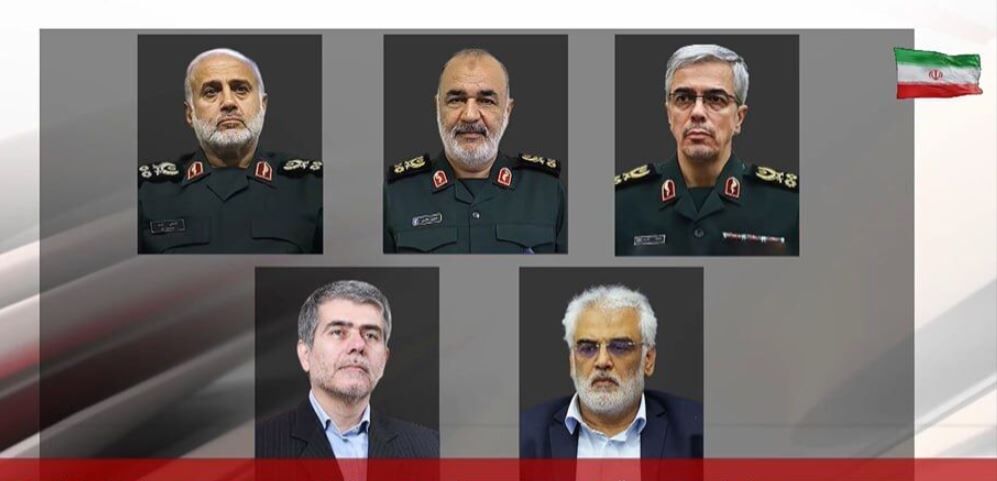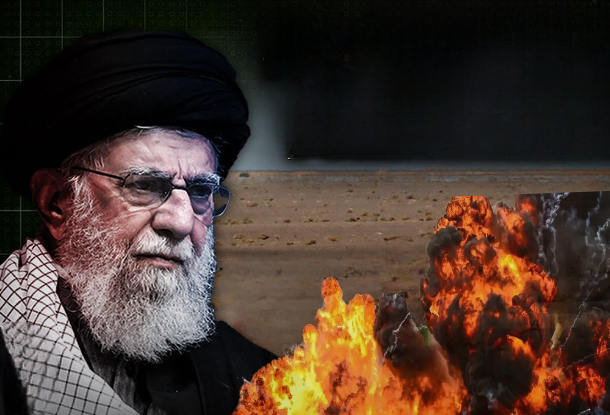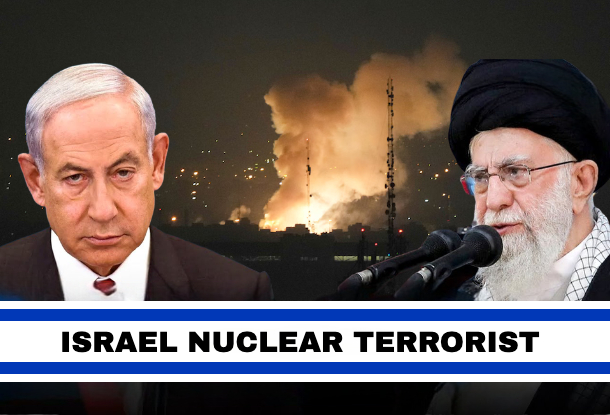In the early hours of Friday, June 13, an unprovoked Israeli strike targeted various regions within the Islamic Republic of Iran (IRI), including both civilian and military installations. Reportedly, more than 200 Israeli Air Force fighter jets hit more than 100 nuclear, military and infrastructure targets across Iran, including its main nuclear facility in Natanz. This attack resulted in the deaths and injuries of numerous Iranian citizens, among them women and children, as well as several commanders of the Iranian armed forces, and Scientists. The Communications Centre of the General Staff of the Armed Forces vehemently denounces this overt act of aggression by the malicious Zionist state, which starkly contravenes all established principles of international law. Following the directives of the Supreme Leader and Commander-in-Chief of the Armed Forces, Ayatollah Seyyed Ali Khamenei, the General Staff reassures the Iranian populace that the response from the soldiers of the Armed Forces of the Islamic Republic of Iran to the instigators, perpetrators, and supporters of this act of agreession will be formidable and resolute, delivering a blow that will leave Israel with profound regret. Supreme Leader Ayatollah Ali Khamenei cautioned Israel that it “must anticipate severe retribution” in the wake of its “offense,” while Israeli Prime Minister Benjamin Netanyahu indicated that the military campaign will persist for as long as deemed necessary.
VIDEO: Satellite Imagery Shows Iran’s Natanz Nuclear Facility Damaged in Israeli Strikes (Source: DWS News)
.
According to Tasnim News Agency, the Chief of Staff of the Iranian Armed Forces Major General Mohammad Hossein Baqeri, Commander of the Islamic Revolution Guards Corps Major General Hossein Salami, Commander of Iran’s Khatam al-Anbia Central Headquarters Major General Gholam Ali Rashid, Commander of the IRGC Aerospace Force Major General Amir Ali Hajizadeh, and at least six Iranian nuclear scientists have been martyred in the strikes. The world was quick to react to Israel’s violent attacks on Iran’s nuclear and civilian sites. Two prominent Iranian nuclear scientists were included among six scientists who lost their lives in Israeli airstrikes: Mohammad Mehdi Tehranchi, Fereydoun Abbasi, Seyyed Amir Hossein Faqhi, Abdolhamid Minouchehr, Ahmad Reza Zolfaghari, and Motabizadeh.
I
MAGE: According to the Iranian Broadcasting Agency, so far, five of the country’s senior military commanders, officials, and nuclear scientists have been martyred in the Zionist regime’s terrorist operation on Friday morning. General Mohammad Bagheri, Chief of Staff of the Armed Forces, Major General Hossein Salami, Commander-in-Chief of the Islamic Revolutionary Guard Corps, Brigadier General Amir Ali Hajizadeh, Commander of the IRGC Aerospace Force, and Major General Gholam Ali Rashid, Commander of the Khatam Al-Anbia Central Headquarters (Source: Iranian Broadcasting Corporation (IRCC))
Rafael Grossi, the director general of the International Atomic Energy Agency (IAEA), has immediately cautioned that the assaults executed by the Israeli Military on Iranian nuclear installations represent a breach of the tenets of the United Nations Charter, international law, and the Statute of the International Atomic Energy Agency. Grossi addressed the Board of IAEA Governors and stated:
“This morning, the IAEA was informed of the military operations launched by Israel, including attacks against nuclear facilities in the Islamic Republic of Iran. We are in contact with the Iranian authorities responsible for nuclear safety to assess the situation and the potential impacts on nuclear security.”
“Iranian authorities have confirmed that the Natanz enrichment site has been affected, but no increase in radiation levels has been detected. The Isfahan and Fordo sites have not been damaged.” Grossi stated, adding, “This is a very worrying development. I have repeatedly stated that nuclear facilities must not be targeted under any circumstances, as this could harm human beings and the environment. These attacks have serious consequences for nuclear safety, security, safeguards, as well as for regional and international peace and security.”
A multitude of resolutions from the General Conference denounce armed assaults on peaceful nuclear facilities, notably resolutions GC(XXIX)/RES/444 and GC(XXXIV)/RES/533, which articulate:
“Any armed attack against nuclear installations used for peaceful purposes, or the threat thereof, constitutes a violation of the principles of the Charter of the United Nations, international law and the Statute of the Agency.”
Earlier today, Al Jazeera reported on how countries and international organisations manifested their concerns regarding Israel’s “unilateral attack on Iran. As reported by the Associated Press, the United States is now reallocating its military assets in the Middle East due to the strikes by Israel and the potential for a retaliatory attack from Iran. The US Navy has ordered the destroyer USS Thomas Hudner to begin its journey towards the Eastern Mediterranean and has instructed a second destroyer to start advancing, ensuring its availability should the White House make a request. According to Tasnim News Agency, the Head of the Atomic Energy Organisation of Iran (AEOI), Mohammad Eslami, said that “Israel military attacks have caused only superficial damages to the Natanz nuclear facility in Iran’s central province of Isfahan, and have not caused casualties at the subterranean site.” The Trump administration has maintained that Washington did not participate in Israel’s military operation, however, during a telephone interview with CNN reporter Dana Bash, US President Donald Trump commended Israel’s military actions against Iran, describing them as “a highly effective strike,” and cautioned Tehran to engage in negotiations before it is too late. Trump asserts that Iran has allegedly disregarded a 60-day ultimatum he had earlier presented, stating:
“Iran should have listened to me when I said – you know I gave them, I don’t know if you know but I gave them a 60-day warning and today is day 61.”
On Friday, Iran, Iraq, and Jordan restricted their airspace, while Israel closed its primary airport following Israeli airstrikes that affected global aviation. The violent attacks by Israel on Iran not only represent a serious infringement on the sovereignty and territorial integrity of Iran, a sovereign member of the United Nations, but also qualify as acts of aggression and war crimes according to international law and humanitarian law, including the Geneva Conventions. Firstpost has the story…

Firstpost reports…
Israel strikes Iran’s nuclear sites, top brass killed: Is West Asia headed for an all-out war?
Israel has launched its largest military strike on Iran, targeting nuclear facilities, missile factories and senior military commanders in Operation Rising Lion. With top Iranian officials and scientists killed, and Iran retaliating with drone attacks, the region teeters on the edge. Is this the beginning of a wider war in West Asia?
Israel has launched a sweeping military operation against Iran, targeting its nuclear infrastructure, key missile production sites and top military commanders.
The offensive, declared by Israeli Prime Minister Benjamin Netanyahu as Operation Rising Lion, marks one of the most significant direct confrontations between the two countries in decades.
The strikes, described by the Israel Defense Forces (IDF) as a preemptive move to neutralise what it claims is an existential threat, have led to high-profile casualties, mass mobilisation of Israeli troops, airspace closures across several countries and renewed uncertainty over ongoing diplomatic efforts involving Iran’s nuclear programme.
Why Israel says it attacked Iran
Israeli military spokesman Brigadier General Effie Defrin said the operation involved 200 fighter jets conducting simultaneous strikes on over 100 targets across Iran.
Among the key locations struck was the uranium enrichment facility at Natanz, Iran’s main nuclear site. The offensive, which Defrin said aimed to degrade Iran’s ability to produce a nuclear bomb, also targeted ballistic missile factories and senior military leadership.
“This is a critical operation to prevent an existential threat, by an enemy who is intent on destroying us,” said Israeli military Chief of Staff Eyal Zamir, who announced that tens of thousands of Israeli soldiers had been deployed across all borders.
Netanyahu, in a video address, declared, “We are at a decisive moment in Israel’s history,” adding that the campaign would “continue for as many days as it takes to remove this threat.”
A senior Israeli official told Axios that, alongside airstrikes, Mossad conducted covert sabotage operations inside Iran to disable strategic missile systems and air defences.
What damage did Israeli strikes do in Iran
Iran confirmed that multiple senior military officials were killed in the strikes. These include Hossein Salami, commander of the Islamic Revolutionary Guard Corps (IRGC), as well as the chief of staff of the Iranian Armed Forces and the head of Iran’s Emergency Command.
Iranian state media also reported the deaths of two nuclear scientists, Fereydoun Abbasi and Mohammad Mehdi Tehranchi, in Tehran.
Additionally, reports stated that the IRGC’s headquarters in Tehran was hit, and several civilians, including children, were killed in a strike on a residential area of the capital.
In response, Iran launched over 100 drones targeting Israeli territory. The IDF said it was intercepting these threats in real-time, as the country entered a state of emergency in anticipation of additional retaliatory strikes.
Ayatollah Ali Khamenei, Iran’s Supreme Leader, condemned the Israeli actions in a statement, saying Israel had “unleashed its wicked and bloody” hand and would receive “a bitter fate for itself.”
Iranian armed forces’ spokesperson warned that Israel and the United States would pay a “heavy price” for the attacks, accusing Washington of providing operational support.
However, US Secretary of State Marco Rubio stated, “The United States was not involved in the strikes and Tel Aviv had acted unilaterally for self-defence.” He also warned, “Iran should not target US interests or personnel.”
What does this mean for nuclear talks?
The timing of the Israeli strikes is particularly significant. They occurred just days before a planned sixth round of US-Iran talks in Oman concerning Tehran’s nuclear enrichment activities.
While the talks were still scheduled to proceed, it remains unclear how the attack may affect the willingness of both sides to negotiate in good faith.
The US administration, led by Donald Trump, has maintained that Iran must never possess a nuclear weapon and has expressed hopes to resume negotiations. “We will see,” Trump said in an interview with Fox News, reiterating the US interest in diplomatic engagement.
However, Trump has also convened a National Security Council meeting to assess the situation and discuss contingency plans, including potential evacuation of American civilians from the region, according to a US official.
Iran’s government, responding to the attack, said the Israeli action justified its continued commitment to nuclear enrichment and military deterrence. It called the airstrikes “cowardly” and accused Israel of deliberately targeting civilian centres.
Despite this, Iran’s National Oil Refining and Distribution Company confirmed that refining and storage facilities were undamaged and fully operational.
The United Nations Secretary-General António Guterres, through his deputy spokesperson Farhan Haq, urged de-escalation.
“The Secretary-General asks both sides to show maximum restraint, avoiding at all costs a descent into deeper conflict, a situation that the region can hardly afford,” Haq said.
Will this mean an all-out war in the region?
The immediate aftermath of the strikes has seen a wave of disruptions across the region. Airspace over Israel, Iran, Iraq, and Jordan was cleared as international airlines rerouted or cancelled flights to avoid conflict zones.
Tel Aviv’s Ben Gurion Airport has been shut down until further notice. Iran also closed its airspace to civilian traffic.
The global economy has also begun to feel the strain. Markets in Asia registered sharp declines, oil prices surged and investors shifted towards traditional safe-haven assets such as gold and the Swiss franc.
As of now, Israel’s political and military leadership continues to prepare for further escalation. Foreign Minister Gideon Saar has been in contact with international counterparts to clarify the rationale behind Israel’s actions and to manage diplomatic fallout.
Meanwhile, Israeli officials maintain that the threat posed by Iran had reached an intolerable level. Netanyahu asserted that Iran’s advances in missile technology and its uranium enrichment efforts meant that delaying action would jeopardise Israel’s future.
“We can’t leave these threats for the next generation,” he said.
Eyal Zamir echoed this sentiment, stating that the operation was “an imperative to remove the strategic threat and ensure our future.”
While Israel has not indicated whether it intends to continue with further strikes, the initial phase of Operation Rising Lion has already inflicted significant damage.
Despite Netanyahu’s remarks about the Iranian people’s “imminent liberation from tyranny,” Israeli defence sources have made it clear that the aim is not regime change, but the disruption of Iran’s nuclear and ballistic programs.
The International Atomic Energy Agency has confirmed that Iran’s uranium stockpile is expanding rapidly. Israeli officials believe the public estimate of Iran having enough uranium for nine bombs could be conservative, and suggest the enrichment may be further along than reported.
READ MORE IRAN NEWS AT: 21st Century Wire IRAN Files
SUPPORT OUR INDEPENDENT MEDIA PLATFORM – BECOME A MEMBER @21WIRE.TV
VISIT OUR TELEGRAM CHANNEL
Click this link for the original source of this article.
Author: Global Affairs
This content is courtesy of, and owned and copyrighted by, https://21stcenturywire.com and its author. This content is made available by use of the public RSS feed offered by the host site and is used for educational purposes only. If you are the author or represent the host site and would like this content removed now and in the future, please contact USSANews.com using the email address in the Contact page found in the website menu.








